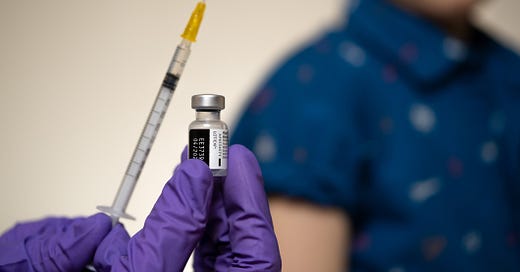Hey, CDC! Show us the data...
Before you add the Covid-19 shot to the pediatric vaccine schedule. By Dr. Kimberly Greene-Liebowitz and Dr. Megan Martin
As we wrap this week of highly charged political debates, vaccine mandates are on many people’s minds. Even before ACIP voted to add Covid-19 to the routine vaccine schedules, New Yorkers wanted to know, would Governor Kathy Hochul mandate the shot for schoolchildren next fall? When, finally pressed on the issue, Governor Hochul left the door open, “Not at this time… That would need to go through the legislature. Not this year."
So we asked two of our favorite public health experts, both mothers, themselves, to lay it out for us- is there any justification for mandating the Covid-19 vaccine for schoolchildren? What does the data say?
Here’s what Drs. Greene-Liebowitz and Martin want to share with you:
- Natalya & Dana
On Thursday, October 20, the Advisory Committee on Immunization Practice (ACIP), a subsidiary of the CDC, voted to add the COVID-19 vaccines to the child and adult vaccine schedules. Although the CDC recommendations do not serve as mandates, many states, municipalities, educational institutions and employers have relied heavily upon them since March 2020, treating them as gospel. It is therefore likely that these CDC recommendations will translate into mandates imposed upon our children.
We are gravely concerned about the implications of this decision.
To date, no data has been provided by the pharmaceutical companies regarding the safety or efficacy of the Covid-19 vaccine that would warrant such an important change. It is troubling that they have chosen to move forward without this necessary information. Currently, the Covid-19 vaccine is only approved with Emergency Use Authorization (EUA) for children under 12. Adding an EUA- only approved vaccine to this schedule has shaken the confidence of parents and caregivers across the United States, and is out of step with nearly every Western nation – many of which have stopped offering this vaccine to pediatric patients.
It has been clear since the early phase of this pandemic that it would be impossible to eradicate SARS-CoV-2. There are for four key reasons for this: asymptomatic spread, nonhuman hosts, frequent mutations, and waning immunity. Furthermore, although COVID-19 vaccines are protective against severe disease and death, especially in the elderly, immunocompromised, and those with multiple comorbidities, they do not prevent viral transmission. SARS-CoV-2 is now an endemic virus and will circulate for the foreseeable future. We can no longer put our lives on hold. We must return to “normal life,” which includes allowing our children to grow up in a way that compensates for the losses of the past three years, and permits them to have a healthier, less burdensome future
It was therefore with significant concern that we read of this ACIP meeting. While we have no objection to allowing the Vaccines for Children program (VFC) to fund COVID-19 vaccines - since a small number of very high risk children may benefit from them - there simply isn’t data to support their widespread use in immunocompetent children. It is well-known that the primary purposes of vaccination are to reduce disease severity and spread, but there is no evidence that the COVID vaccines achieve either goal in children.
The studies of the vaccine in children did not report data on disease outcomes. For example, in July 2021, Frenck et al published a study of the BNT162b2 vaccine in adolescents 12-15 years of age that reports data on antibody production in response to vaccination. They refer to this as “immunobridging,” or inferring the effectiveness of a vaccine through immunogenicity data. After vaccination, researchers completely disregarded the possibility of asymptomatic infection, testing only symptomatic teenagers for COVID. Their conclusion of “100% vaccine effectiveness vs infection” is therefore unsubstantiated.
In December 2021, a study by Ali et al concluded that “The vaccine efficacy of mRNA-1273 14 days after the second injection was difficult to assess precisely because of the low incidence of COVID-19 in the trial population (four cases in the placebo group and no cases in the mRNA-1273 group).
In a study of the primacy vaccine series in children 5-11 published this summer by Tan et al., vaccine efficacy was 36.8% vs any infection, which is less than the average efficacy of the flu vaccine. There were no deaths in the study, so the authors were unable to demonstrate a mortality benefit for the vaccine. One cannot improve on zero deaths. Early booster studies suggested boosters did not benefit anyone under the age of forty, let alone fifteen - or five. A search of PubMed yields not a single study devoted to the efficacy or safety of the Covid-19 booster in the immunocompetent pediatric population.
More concerning than the lack of efficacy are the variable reports about adverse events. There have been a number of studies - including those from Israel and Thailand - indicating concerning levels of myocarditis, particularly in young boys and men. Cardiac events appear to occur with greater frequency as the number of doses of vaccine increases but this has not been addressed adequately in CDC publicity or discussions. We know, because the provider-specific information sent from the CDC and the New York State Department of Health talks about how to overcome vaccine hesitancy - not how to answer questions on adverse effects. We suspect this is because the CDC is relying on its own study on the topic, which used substandard statistical methods and had a subpar design. A randomized controlled clinical trial – the gold standard of medical research – should have been conducted to fully evaluate serious adverse events prior to adding this vaccine to the vaccine schedule.
The bottom line is that the CDC - and ACIP - are tasked with creating public health policy to keep our children safer. Until now, the vaccine schedule has included well-studied vaccines with robust data on their safety and efficacy, including in children. As shown above, this is not true of the vaccines directed at SARS-CoV-2. They have not been shown to be efficacious or safe, are less well-studied than any other vaccine on the schedule, and with the ongoing and rapid mutation of the SARS-CoV-2 virus, it is unlikely they will yield any benefit in children. It is also important to consider that COVID causes extremely low mortality and harm in children - even MIS-C cases have declined with newer variants.
This vaccine should not have been added to the vaccine schedule, and categorically should not be mandated. Parents should not be forced to choose between giving their children a potentially harmful and likely ineffective drug or having access to education, services and activities available to adults - all of whom are at higher risk, and none of whom will be required to vaccinate.
Dr. Greene-Liebowitz is a board-certified emergency physician and has a master's degree in public health in epidemiology and biostatistics. Follow her at @KGLiebowitz
Dr. Martin is a private practice, board certified anesthesiologist with a master’s degree in public health in epidemiology and biostatistics. Follow her at @Megmd514
Collectively, they are parents of four children, three of whom are under 16 years old.







